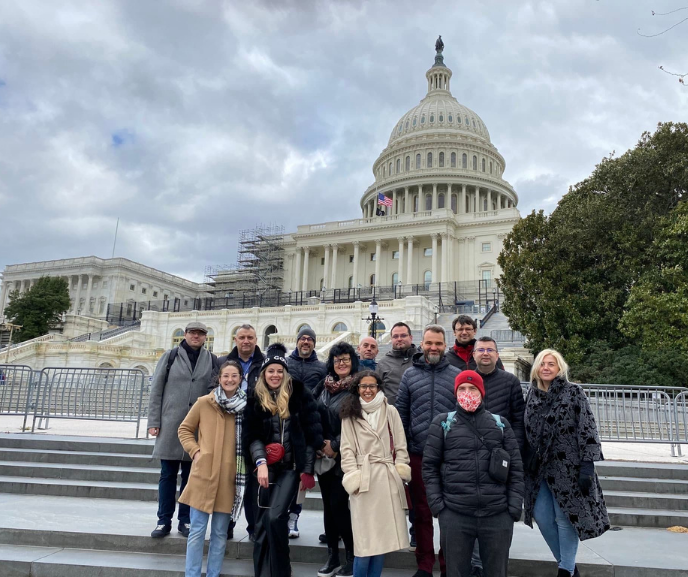Romania took hold of my heart in 2015 and since then has consumed my mind and soul. As with any genuine commitment, my relationship with this beautiful, complex country has grown and deepened over time as I have learned of its many tragedies, as well as its many triumphs. I have surrendered myself to Romania. [...] As I continue my Romanian journey, I marvel over the resiliency and fortitude of the people. I am fortunate to have developed close relationships, familial in many ways, with many Romanians. And I am eternally grateful to have been granted a Fulbright and honored to become part of this amazing community.
Cybersecurity in universities – Study visits to the U.S.
The Romanian-U.S. Fulbright Commission together with Fulbright Commissions based in Poland, Bulgaria, Czech Republic, Hungary, and Slovak Republic developed the “Cybersecurity in universities – Study visits to the U.S.” program in partnership with World Learning and Marymount University. The aim of the program was to acquaint participants with the scope of cybersecurity studies conducted in the U.S., the catalog of specializations, most common course content/curriculum and thus to facilitate the development of cybersecurity programs in universities of Central and East European countries.
30 scholars representing universities that have cybersecurity programs (or with a program near to open) from 8 countries (Bulgaria, Estonia, Hungary, Latvia, Lithuania, Poland, Romania, and Slovak Republic) participated in the program. The study visits have been carried out in a hybrid form in 2021-2022, combining virtual meetings with an in-person visit to the U.S.
The virtual component included 16 online meetings extended over a 4-month period (March-June 2021) with discussions about cybersecurity education, attack actors and vectors, impact of cyber attacks, laws, regulations and policies, cyber defense tools, collaborative approaches, impact of new technologies, cybersecurity in the public sector, business and entrepreneurship in cybersecurity, landscape of US academic programs in cybersecurity, and many other important topics for the field.
The in-person component took place in March-April 2022, once the pandemic restrictions became more manageable. The participants were divided in two groups and visited various higher-education institutions in Washington D.C. and New York City. Both groups had the chance to meet and discuss about cybersecurity education with academics and administrators from Marymount University, George Washington University, Prince George’s Community College, University of Maryland Global Campus, Howard University, City College of New York, New York University, and Columbia University, but also with cybersecurity experts from the National CyberWatch Center, Maryland State Department of Information Technology, U.S. Department of Labor, Bureau of Diplomatic Security at the U.S. Department of State, New York City Economic Development Corporation, Financial Services Information Sharing and Analysis Center, and various companies.
More details about the in-person visit are available on Fulbright Poland’s website, the initiator and coordinator of the program: https://fulbright.edu.pl/cybersecurity/
Selected participants:
- Adrian Alexandrescu (Romania), Gheorghe Asachi Technical University of Iasi, Department of Computer Science and Engineering
- Titus Constantin Bălan (Romania), „Transilvania” University of Brasov, Department of Electronics and Computers
- Boris Bučko (Slovak Republic), University of Žilina, University Science Park / Faculty of Management Science and Informatics
- Linas Bukauskas (Lithuania), Vilnius University, Cybersecurity laboratory, Institute of Computer Science
- Adrian Viorel Coleșa (Romania), Technical University of Cluj-Napoca (TUCN), Computer Science
- Sintija Deruma (Latvia), BA School of Business and Finance, Department of Management
- Dimitar Dimitrov (Bulgaria), University of National and World Economy, National and Regional Security
- Piotr Filipkowski (Poland), SGH Warsaw School of Economics, Institute of Information Systems and Digital Economy
- Dorottya Futóné Papp (Hungary), Budapest University of Technology and Economics, Department of Networked Systems and Services
- Veselina Gagamova (Bulgaria), “G. S. Rakovski” National Defence College, Command and Staff Faculty
- Marcin Głowacki (Poland), Wroclaw University of Science and Technology, Electronics
- Kacper Gradon (Poland), University of Warsaw, Faculty of Law and Administration
- Ioan Daniel Hunyadi (Romania), “Lucian Blaga” University of Sibiu, Department of Mathematics and Informatics
- Dorin Iordache (Romania), Ovidius University of Constanta, Mathematics and Informatics
- Ignas Kalpokas (Lithuania), Vytautas Magnus University, Political Science and Diplomacy
- Balázs Kárász (Hungary), National University of Public Service (NUPS), Doctoral School of Military Engineering
- Roland Kelemen (Hungary), Széchenyi István University, Legal History
- Dezdemóna Kovács (Hungary), University of Szeged, Law and Political Science, International Relations
- Agata Manolova (Bulgaria), Technical University of Sofia, Faculty of Telecommunications
- Anna-Maria Markova (Bulgaria), University of National and World Economy, National and Regional Security
- Sten Mäses (Estonia), Tallinn University of Technology, Department of Software Science
- Dóra Molnár (Hungary), National University of Public Service, International Security Policy Department
- Borislav Nikolov (Bulgaria), Nikola Vaptsarov Naval Academy, Information Technologies
- Arnis Paršovs (Estonia), University of Tartu, Institute of Computer Science
- Răzvan Victor Rughiniș (Romania), Politehnica University of Bucharest, Department of Computers
- Krzysztof Rzecki (Poland), AGH University of Science and Technology, Department of Biocybernetics and Biomedical Engineering
- Witold Sobolewski (Poland), Lazarski University, IT Academy
- Alvis Sokolovs (Latvia), Vidzeme University of Applied Sciences, Faculty of Engineering
- Soňa Sopúchová (Slovak Republic), Comenius University in Bratislava, Institute of Information Technology Law and Intellectual Property Law
- Anton Stoilov (Bulgaria), American University in Bulgaria, Computer Science Department
Learning objectives
• to acquaint participants with the scope of cybersecurity studies conducted in the U.S., the catalogue of specializations and most common course content/curriculum;
• to showcase several examples of successful cybersecurity Ms/Bs/ certification programs run by distinguished U.S. universities;
• to reflect upon best practices in organizing and running cybersecurity programs;
• to discuss the most current challenges in cybersecurity and studies devoted to the subject;
• to familiarize the group with the latest developments in cybersecurity.
The program of the visit featured:
- Virtual component: 16 online meetings extended over a 4-month period (March-June 2021). The preliminary schedule is available here.
- Meetings with faculty: Meetings with several universities’ faculty and administrators of cybersecurity programs (i.e. Marymount University, Virginia Tech).
- Training: A training program at Marymount University (hybrid format: 8 virtual meetings and 2 days on campus during the in-person component).
- Meetings with practitioners: Meetings with practitioners in the field of cybersecurity – both business and state-related entities, Meeting are expected in online and in-person formats.
- In-person component: An 8 days visit to the U.S. East Coast in the Spring of 2022.
![]()
![]()





